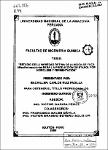| dc.contributor.advisor | García Pérez, Víctor | |
| dc.contributor.advisor | Sales Dávila, Francisco | |
| dc.contributor.advisor | Sotero Solís, Victor Erasmo | |
| dc.contributor.author | Ruíz Padilla, Carlos | |
| dc.date.accessioned | 2016-09-24T01:44:35Z | |
| dc.date.available | 2016-09-24T01:44:35Z | |
| dc.date.issued | 2009 | |
| dc.identifier.other | T/661.806/R94 | |
| dc.identifier.uri | http://repositorio.unapiquitos.edu.pe/handle/20.500.12737/3020 | es_PE |
| dc.description.abstract | El objetivo de este estudio fue evaluar variedades de raíces de yuca ' (Manihot Escu/enta) con la finalidad de determinar la variedad que sea óptima para la producción de etanol, ya que ésta raíz sólo se aprovecha como producto de supervivencia para el campesino ó se comercializa como raíz, y poco es lo que transforma de éste en otros productos que tengan un valor agregado y pueda ser beneficioso para el productor o enriquezca la cadena productiva. Se utilizó para ello cinco variedades locales que son: "Huanuqueña", "Enana", "Amarilla", "Señorita", y "Huangana amarilla". El estudio se dividió en tres etapas; en primer lugar determinar la variedad que tiene mayor rendimiento en almidón, luego se prosiguió con la segunda etapa, determinar la relación pH-concentración de almidón para llevar a cabo la hidrólisis ácida, para lo cual se escogió una variedad de almidón al azar, y con esto determinar los parámetros óptimos de operación. Se puso en baño maría durante cinco horas y media a 95 °C con HCI 12N. Determinado esto, se siguió con la última etapa, la hidrólisis y fermentacion de las cinco variedades, utilizando para la fermentación una cepa pura de Saccharomyces cereviseae MIT- L51, cedida por el Laboratorio de Microbiología de la Universidad Nacional de Trujillo; al completar la fermentación se evaluó la cantidad de alcohol obtenida, por el método de microdifusión. La etapa de fermentacion se realizó en una incubadora a una temperatura de 30 °C y un pH de 4.5 para que existan condiciones estándar en este proceso. A través de un análisis de ANVA y Tukey en las distintas etapas, realizadas en un programa computacional INFOSTAT se determinó que la variedad "Amarilla" es óptima de acuerdo al rendimientQ en almidón y etanol sobre las demás variedades estudiadas. | es_PE |
| dc.description.abstract | The lens of this study was to evaluate varieties of roots of yucca (Manihot
Escu/enta) with the purpose of determining the variety that is ideal for the
production of ethanol, since this one root only takes advantage as product
of survival for the peasant ó it is commercialized as root, and little is what it
transforms of this one into other products that have an added value and
could be beneficia! for the producer or enrich the productive chain. One
used for it five local varieties that are: "Huanuqueña", "Enana", "Amarilla",
"Señorita", and "Huangana Amarilla". The study divided in three stages;
first to determine the variety that has major performance in starch, then it
was continued by the second stage, the relation determined pHconcentration
of starch to carry out the acid hydrolysis, for which chose a
variety of starch at random, and with this to determine the ideal
parameters of operation. lt put in bain-marie for five hours and a half on 95
oc with HCI 12N. Determined this, it followed with the last stage, the
hydrolysis and fermentation of five varieties, using for the fermentation a
pure strain of Saccharomyces cereviseae MIT - L51, yielded by the
Laboratory of Microbiology of the National University of Trujillo; on having
completed the fermentation the quantity of alcohol was evaluated
obtained, for the method of microdiffusion. The stage of fermentation was
realized in an incubator to a temperature of 30 °C and a pH of 4.5 in order
that conditions exist standard in this process. Across an analysis of ANVA
and Tukey in the different stages realized in a program computacional
INFOSTAT decided that the "Amarilla" variety is ideal in agreement to the
performance in starch and ethanol on other studied varieties. | en_US |
| dc.description.uri | Tesis | es_PE |
| dc.format | application/pdf | en_US |
| dc.language.iso | spa | es_PE |
| dc.publisher | Universidad Nacional de la Amazonia Peruana | es_PE |
| dc.rights | info:eu-repo/semantics/openAccess | en_US |
| dc.source | Universidad Nacional de la Amazonia Peruana | es_PE |
| dc.source | Repositorio Institucional - UNAP | es_PE |
| dc.subject | Etanol | es_PE |
| dc.subject | Almidones | es_PE |
| dc.subject | Yuca | es_PE |
| dc.subject | Manihot Esculenta | es_PE |
| dc.subject | Hidrolisis | es_PE |
| dc.subject | Fermentación | es_PE |
| dc.title | Estudio de la variedad óptima de almidón de yuca (Manihot esculenta) para la producción de etanol por hidrólisis y fermentación | es_PE |
| dc.type | info:eu-repo/semantics/bachelorThesis | en_US |
| thesis.degree.discipline | Ingeniería Química | es_PE |
| thesis.degree.grantor | Universidad Nacional de la Amazonia Peruana. Facultad de Ingeniería Química | es_PE |
| thesis.degree.level | Título Profesional | es_PE |
| thesis.degree.name | Ingeniero Químico | es_PE |
| thesis.degree.program | Regular | |
| dc.subject.ocde | http://purl.org/pe-repo/ocde/ford#2.04.02 | es_PE |

